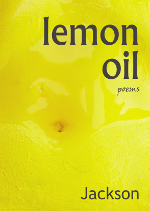
Lemon Oil by Jackson
Mulla Mulla Press, 2013
The final poem in Lemon Oil, titled ‘The right metaphor’, combines the thesis of independence with the antithesis of loneliness to synthesise a new metaphor for love. Love, Jackson tells us, is not a chain, a cage, or a leash, but a long elastic cord that lets us fly free yet binds us to each other, ensuring that ‘there’s always/ a way home’. This tension between two desires (one for freedom, the other for closeness) is emblematic of the book as a whole.
While the book seems to be told from the perspective of a single, first-person speaker, this speaker adopts multiple, often inconsistent views on a variety of topics. She desires to inhabit Suzanne Vega
a pixie wisp with big eyes narrow bones a voice like a 2mm sable brush (‘suzanne vega’)
but also wants to be a gay man.
because gay boys fuck ... and after a while we’d switch positions and give each other the same, identical equal joy (‘I wish I was a gay man’)
She rolls her eyes at over-packaged ‘towel cakes’ in the post office and $5 toothbrushes in the grocery store, but spends hours on Facebook, surrounded by ads for
vanity publishing virtual dating and other new skins (‘Five dollar toothbrush’)
The contradictions often occur in the space of a single poem. She daydreams about growing old with her lover, but balks at the idea of marriage (‘the washing bit’); worries about big social issues, then goes home to write love poetry instead of protest songs (‘sex again’); cries over her ‘ironic breakfast’ of Just Right cereal, but cheers up an angry magpie by sharing a flake (‘wet feathered, sharp sharded’); stays out late with friends and lovers, only to get lonely on the long drive home (‘Someone’).
The book’s best moments weave these contradictions together into a beautiful, messy patchwork.
My mother said not to put my identity in the dryer but I did and it came up fluffy and gorgeous (‘My mother said’)
and
When you dance it’s as if you gather the music ... and spear it through your body, along the long cords of you— … and extrude it down the pipes of your lean limbs. (‘When you dance’)
Jackson’s discussions of sexual desire for the male body are a particularly interesting mix of contradictory emotion. Her narrator aggressively ogles men on public transport
I could write you some porn ... How she hung her stolen prayer flags on the totem pole of your cock (‘Bus-station’)
but is often reticent to make her move
There’s only three feet of air and the whole fuckin’ world between my eyes and his (‘two thin throws’)
Poems about the pain of rejection provide the key explanatory link. In ‘hungry’, a junk-food-loving boyfriend refuses the narrator’s homemade apple pie, while in ‘thin’, a casual partner leaves in the night, and the narrator tries to recover his memory by picking used condoms out of the trash.
I can’t smell him, only an abstraction.
These admissions of vulnerability and strangeness point to another of Jackson’s strengths: she is not afraid to look like a flower child, a pervert or a dork. She titles a poem ‘Fly free’ and begins it with ‘FLY FREE Beautiful Bird FLY FREE’; hits on Charles Bukowski and Dylan Thomas (who don’t call back) in ‘Dylan Thomas’ and ‘Platform 10/10/09’; and touches her friends in public, not caring what people think (‘for Coraline’). This openness makes for a few new-agey moments (in addition to ‘Fly free’, there’s a poem titled ‘Talk to me, brother moon’, complete with sentient trees and sister sun), but the benefits of risk-taking more than make up for the cost of a few gambles that don’t quite come off.
The poem titles in Lemon Oil are often literal tags, or quotations taken directly from the text of the poem, but the best ones are playful: ‘q finger’ turns out to be a sensual daydream where fingers are named by the letters they touch on a qwerty keyboard, while a poem about the relationship between art and sexuality is entitled ‘Art for fuck’s sake’. ‘Nightstick’ turns out to be a critique of violent sexual imagery as used by the political left – can you really trust an activist who yells ‘FUCK YOU CUNT’ at a police officer?
There is also a good deal of playfulness in Jackson’s deft portraits of people, places and animals. Pretty women have
bed-curtain hair candlestick laugher and art print kisses (‘the washing bit’)
while in Melbourne in 2009
There’s a Nick Cave on every corner in shock-black hair, hitching up his ill-fitting pants (‘Nick Cave Wind’)
Willy wagtails wear ‘prim little aprons’ (‘necessary’); a gull ‘hang-glides/ on the white wind’ (‘on the white wind’); Federation Square is full of ‘Fuck Off architecture’ (‘Melbourne, August 2007’); among their other charms, white boys boast ‘Cleopatra-milk-bath hands’ (‘white boys’).
The narrative voice in Janet Jackson’s Lemon Oil speaks with humour, verve and curiosity, inviting the reader into a conversation about sex, identity politics, industrialism, environmentalism and what to do in Melbourne. You could have some beers with this voice on your back veranda, sit and talk for hours. I bet she makes fantastic mix tapes.














Pingback: "lemon oil" reviewed in Cordite
Pingback: "lemon oil" reviewed in Cordite